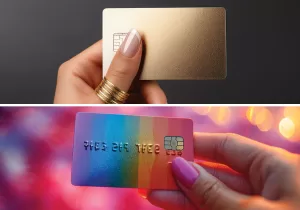
In today’s fast-evolving consumer landscape, expectations are in constant flux. Two major trends have emerged prominently in recent years—the increasing desire for products and services that align with personal values and lifestyles and the demand for hyper-personalized experiences. These shifts signal a departure from one-size-fits-all solutions to a more tailored approach that resonates deeply with individual consumers.
International Card Manufacturers Association (ICMA) member Amanda Gourbault, chief revenue officer at CompoSecure, reviews these trends in detail and examines their implications, particularly within the payments sector.
The Essence of Premiumization
Premiumization is the trend where consumers are willing to pay more for products and services that promise higher quality, exclusivity or status. While this concept might initially evoke images of lavish spending on high-end luxury items, it actually spans a broad spectrum of consumer preferences. At its core, premiumization reflects a nuanced set of desires:
- Lifestyle Compatibility: Today’s consumers, regardless of their income level, are seeking products that align with their personal beliefs and way of life. They are drawn to brands that reflect their values and offer solutions that fit seamlessly into their daily routines.
- Signaling and Image Projection: Products have become more than mere tools; they are symbols of status and identity. Consumers use their purchases to project their image, aspirations and affiliations. In this context, premium products often serve as status symbols that convey a message about who the user is and what they stand for.
- Emotional Gratification: Beyond functional benefits, premium products fulfill emotional needs. They offer a profound sense of satisfaction and personal fulfillment, enhancing the overall consumer experience by tapping into deeper emotional gratifications.
Defining Hyper-Personalization
Hyper-personalization takes the concept of personalization to the next level by delivering products and services that are meticulously tailored to individual preferences. This represents a significant shift from generic, mass-market solutions to highly customized interactions. The rise of Big Tech companies has set new standards for personalization, making it the new expectation for consumer experiences.
- Influence of Big Tech: Giants like Amazon and Meta have revolutionized user interactions by providing personalized recommendations and tailored experiences. Their success has heightened consumer expectations, with many now expecting similar levels of personalization across all their interactions.
- Expectations of Gen Z and Millennials: Today’s younger generations, particularly Gen Z and millennials, have grown up in an environment where personalization is the norm. Their desire for unique experiences is not just about exclusivity but also about sharing these experiences on social media. This demographic’s inclination toward personalization is shaping broader consumer trends.
Shaping Memorable Payment Experiences
In the banking industry, these trends are manifesting in innovative ways. Matt Turner, head of digital at HSBC UK, highlights this shift: “Getting to a one-to-one level of personalization is definitely a focus for us.” Banks have a unique advantage in the quest for hyper-personalization due to their deep understanding of customer financial behaviors. This understanding allows them to create tailored, real-time offerings that cater to individual needs.
Transforming Payment Interactions
Payment interactions are among the most frequent touchpoints between banks and their customers. Recognizing this, banks are leveraging credit and debit cards to meet the growing demand for both premium and personalized experiences. The rise of metal cards exemplifies this trend. These cards not only offer a distinctive tactile experience but also serve as a status symbol.
- Metal Cards: The growing popularity of metal cards is a testament to the premiumization trend. These cards stand out due to their weight and the distinctive “clang” sound they make when dropped. Some metal cards are further personalized by engraving the cardholder’s signature directly onto the metal, adding an extra layer of uniqueness.
- From Functionality to Fashion: Payments have evolved beyond mere transactions to become an integral part of a consumer’s lifestyle statement. The payment card, once a simple tool for financial transactions, has transformed into a fashion statement that reflects personal style and status.
The Path to Success in Banking
In the current era, the formula for success in banking is evolving. The adage “Save your customers money, and they’ll remain loyal today. Make your customers feel unique, and they’ll remain devoted to you indefinitely” captures the essence of this transformation. Banks that focus on delivering personalized and premium experiences are likely to forge stronger, long-lasting relationships with their customers.
Conclusion
The trends of premiumization and hyper-personalization are reshaping the consumer landscape, particularly in the payments sector. As consumers increasingly seek products that align with their values and demand highly tailored experiences, businesses must adapt to meet these expectations. In banking, this means leveraging deep customer insights to offer unique, premium products that resonate on a personal level. By embracing these trends, companies can not only enhance their customer engagement but also build enduring loyalty in an increasingly competitive market.
More Insights on Card Trends
For more than 30 years, ICMA has represented the interests of the card manufacturing industry—which includes manufacturers, personalizers, issuers and suppliers—as its leading global association.
Throughout the year, ICMA members have the opportunity to share insights and knowledge by giving presentations during ICMA webcasts and events. The association’s main event is its annual Card Manufacturing & Personalization EXPO. The 2025 EXPO will take place from May 12-15 in Orlando, Florida.
ICMA offers regular educational opportunities, including ACE-Manufacturing, ACE-Personalization and ACE-Advanced Technologies training and exams at the ICMA EXPO. ICMA also offers ACE-Commercial training, which provides sales, marketing, customer service and other key personnel at ICMA member companies with the opportunity to learn the fundamentals of card manufacturing.
Learn more about the benefits of ICMA membership.
